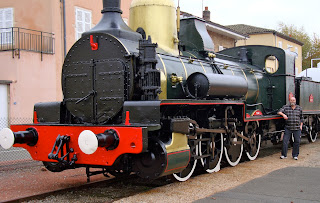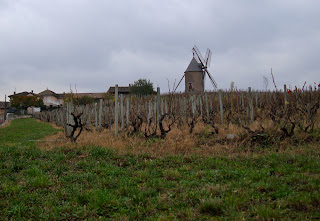The garden in November...
The garden gate...
Opposite the garden gate - maize waiting to be harvested
Hildie (at the back), Julia and Jean......don't ask!
LA VIE EN FRANCE / LIFE IN FRANCE
BEAUJOLAIS IN AUTUMN: BURNING AND TURNING
As I write this, I am once again in Beaujolais - in deepest rural France - after an absence of almost three months. It’s good to be back again and - as in England - to observe the seasons changing over the land.
The endless fields of waving sunflowers and low-growing salad lettuces have gone, replaced by leeks, or maize - standing tall and awaiting the harvester.
Above all else, though, Beaujolais is wine country. From the garden gate here, I can see the long, blue and misty ridges of the Beaujolais hills just a few miles away to the west, and I know that virtually all the land between here and those serrated hilltops is covered with a carpet of grapevines - a patchwork of vineyards clothing the slopes and surrounding each of the area’s villages and chateaux.
Wine has - as it were - flowed in the veins of local people since the Romans introduced its production when they passed this way 2,000 years ago. So to say that they know what they’re doing and how to do it well, is something of an understatement. After all, Parisians drink more Beaujolais than any other wine. We Brits get through enormous amounts of it, too.
There are reasons for this. Many experts prefer to enthuse knowingly about burgundies and clarets (the name which, unaccountably, the English give to the wines of Bordeaux). They turn up their toffee-noses at the wines of Beaujolais, saying that they do not age well, are therefore best drunk fairly young - and thus never cost the Earth.
To Beaujolais‘ enthusiasts, though - such as myself and the hedonists of Paris - these are precisely the best reasons to drink it. It’s always of (at least) acceptable and reliable drinking quality and thus rarely lets you down. And it doesn’t cost much either, so you can have a supremely enjoyable and Beaujolais-fuelled evening without breaking the bank - an increasingly important consideration in hard times like these.
Producing it is a year-round love affair, whether it’s by the wine-estates - large or small - or by the numerous village co-operatives that still manage to flourish all over France, but especially here in Beaujolais. (You can support these enterprises by choosing a wine marked
Beaujolais Villages.)
Winter is the time of rest and recuperation, for the growers as well as the vines. Neither wants month-long snows or deep, hard frosts. A close watch is kept on the hillsides and in the valleys for damage, and for signs that the long, straight rows of vines are more than merely surviving.
In Spring, the vines are nursed and mulched and pruned (a little) and cosseted to within an inch of their lives. The first signs of grapes are welcomed throughout Beaujolais, for far too often in the past, the crop has been ruined by harsh weather or disease - or sometimes both.
Late Spring and Summer are the times of the hardest work: harvesting and production. The grapes are not allowed to drape decorously over the hillsides for very long. They are cut, pressed, fermented and bottled quickly. This year’s Beaujolais is laid down.
And now, in mid-Autumn, is the time of turning and burning. The growers and their assistants march between the ranks of vines with their soil-adzes - upward-curving, wide spades - turning the soil as they have done for generations. (You can see some variations on these tools in the picture). Small, motorised ploughs have been tried but most growers seem to think that they’re more trouble than they’re worth.
This is also when the major pruning takes place. The vines are trimmed right back to within a foot or so of the earth to encourage fresh, new shoots for the Spring. The wood trimmed off is either sold to souvenir manufacturers (who make those corkscrews with warped and twisted handles out of them) or are burned at the row’s end.
So Autumn is hard work. It’s when many of the surrounding villagers, usually concerned with other things, join in the communal work of turning and burning and are rewarded with Beaujolais Nouveau Weekend, due in just a week or two from now, when the new wine flows freely down the thirsty throats of all the local folk who have helped to produce it - and many others, besides.
-----------------------------
Elsewhere in the blog, I’ve said how interesting it’s been for me to learn about this ‘folk‘ industry and much if what I’ve found out has been courtesy of the Wine Museum at nearby Romaneche-Thorins, where the pictures below were taken yesterday afternoon. As you can see, we were both particularly taken by the locomotive preserved outside the Museum, and by the Shop’s extremely effective Christmas display!
The hilltop windmill near Romaneche-Thorins
(You can usually buy a good bottle of Beaujolais - produced at the Museum - in Fenwick’s. Look for the name ‘Romaneche-Thorins‘ - but be warned; they aren’t cheap!)
-----------------------------------
As I write this part of the blogposting, I am not out and about re-acquainting myself with all those aspects of
la vie en France that I’ve missed so very much recently.
Instead, I’m cowering indoors, sheltering from the torrential rain which hasn’t stopped for 24 hours. It’s filling up the little River Vauxonne that flows down from the nearby hills, past the garden here and into the Saone about a mile away. Hundreds of other streams will dump their loads of rain into the Saone, too, which means there’ll be floods in a few days further south.
Fine city that it is, Lyon will probably - and quite undeservedly - bear the brunt of this Lake District weather. It stands at the confluence of two of France’s mightiest rivers, the Saone and the Rhone, and must therefore withstand floodwaters attacking it from its north - here - and from the mountains of Switzerland as well.
Together, they are a force of nature to be reckoned with. Judging from today’s rain, Lyon has a rare treat in store. I’m glad I’m
here and not
there...
(In fact, floods have already been reported in the south of France.)
Formidable forces of nature are nothing unusual in the Rhone valley. Not only do the cities, towns and villages along its banks have prodigious amounts of water to cope with, they also have one of Europe’s most pernicious winds: the Mistral.
The geographical and meteorological conditions of south-east France mean that, if a slight breeze decides to blow there, it is compelled to accelerate in speed and volume and to proceed in the only direction available to it - southwards down the Rhone valley. When it approaches the sea, it ‘fans out’ in all directions, shaking France’s south coast to its roots.
Make no mistake - the Mistral (‘masterly’ in the old language of Languedoc) is not merely a ‘high wind’ of the sort you have to lean into in order to get anywhere. It’s the sort of monster that invariably blows tiles off roofs, knocks people over and disrupts public transport. It is impossible to predict, and when it blows, it has the potential to wreak havoc along a corridor 50 miles wide and 100 miles long. The fact that it doesn’t is a minor miracle of French life.
For, instead of rushing to get out of its way, the French seem to have adopted a cliched, shoulder-shrugging, attitude to the Mistral, as to an undesirable and unpopular law. They accept it as a fact of regional life and simply ignore it. They get on with whatever they are doing and wish the Mistral away.
Having experienced a slight Mistral ‘fore-wind’, I can confirm how difficult it must be to ignore the real thing when it arrives.
We were on holiday in Nimes earlier this year, a long way down the Rhone valley beyond Lyon. We were enjoying a smashing meal on a restaurant’s outside terrace when, completely against the prevailing weather - which was warm and calm - the awnings over our heads began to flutter and wave wildly. Their supporting poles were straining against the gusts of wind, the water in the neighbouring fountain was being blown upwards and I began to feel vaguely - and then profoundly - uneasy.
What I found genuinely amazing - even awe-inspiring - was the fact that the diners around us hardly seemed to notice anything at all. They continued to eat, drink and chatter despite the wind-blown distractions going on all round them. The only concessions they appeared to make were to hold on to their wine glasses and serviettes a little tighter.
Nobody made any move to get out of the wind - or even seemed to notice it. It would take a lot more than a 50-km-per hour gale to disrupt and spoil a convivial repast or a bottle of fine Cotes du Rhone or Beaujolais.
----------------------------
Linguistic note: That ‘-ais’ ending in French simply indicates an area of origin. The
Marseillaise is from Marseilles, Sauce
Mayonnaise is from the area around Mayonne,
Charolais cattle - fearsome and regrettably common in both countries - come from Charolle.
Beaujolais is the area around the profoundly ugly little town of Beaujeu.
--------------------------------
When I first started visiting France regularly, it was the great and momentous differences between our two countries that made the biggest impressions on me, as you’d expect. They speak an inscrutably mischievous language here, for example: and they drive on entirely the wrong side of the road. You can read all about my grapplings and confrontations with these difficulties in earlier
la vie en France blogpostings.
After a while, though, the little, ‘everyday’, variations of life and culture keep presenting themselves round every corner to remind me that ‘they do things differently here’.
F’rinstance....
Carpets are a great rarity in French homes; not even rugs get much of a look-in. Throughout the house, floors are naked tiles or stone or marble. I love this aspect of French domestic decor and it makes me wonder when wall-to-wall carpeting caught on in England - and why.
I also find myself wondering when and why we dropped the idea of shutters in England - replacing them, I suppose, with curtains.
Every window of every French house has external shutters. To my eye, they are not just pragmatic and useful; they are an adornment to domestic architecture here - and everywhere else that uses them. Which is just about everywhere in Europe.
Why don’t we?
THE MILLOT FAMILY / LA FAMILLE MILLOT
This is a photo of some of the Millot family, with whom I love spending time when I'm here in France; Ludovic ('Ludo') is an old friend of Serge's and really is as big as he looks in the picture.
His wife is called Veronique but, despite having a lovely name like that, is known to all the world as 'Mam'. She's as lovely as her name.
Their son is Julien - 'JuJu'. He's eight years old and is a star - a real petit gentilhomme, as they say here. But don't tell him I said so...
CONTACT ME
Post comments on this blog or email me: truckshunters@googlemail.com





















































